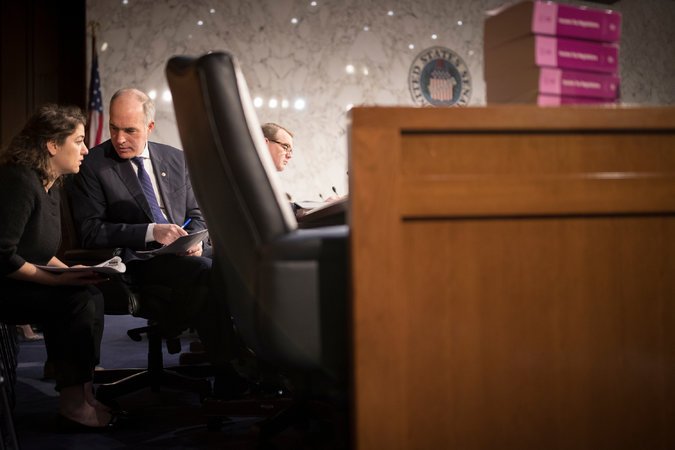“The people this is going to hit are middle-class people that ostensibly this whole bill was supposed to be about helping,” said Senator Claire McCaskill, Democrat of Missouri and a member of the Finance Committee.
Average health insurance premiums in the individual market would increase by about 10 percent, but insurance markets would remain stable in almost all parts of the country, the budget office found.
President Trump has urged his fellow Republicans to repeal the mandate in their tax bill, and in recent days, the idea has gained steam in the Senate Republican conference as lawmakers try to come up with a plan that can receive at least 50 votes.

“We’re optimistic that inserting the individual mandate repeal would be helpful,” said Senator Mitch McConnell, Republican of Kentucky and the majority leader.
But the move risks reigniting the contentious debate over health care that Republicans found themselves mired in for much of the year. Previous efforts to dismantle the Affordable Care Act have failed, leaving Republicans with little legislative success to show for their congressional majority.
“This is turning a tax bill into a health care bill, with our colleagues getting an hour’s worth of notice,” said Senator Ron Wyden of Oregon, the top Democrat on the Finance Committee.
In a letter on Tuesday, groups representing doctors, hospitals and insurers urged congressional leaders to keep the individual mandate in place. The groups, which included the American Medical Association and America’s Health Insurance Plans, wrote that “eliminating the individual mandate by itself likely will result in a significant increase in premiums, which would in turn substantially increase the number of uninsured Americans.”
Advertisement
Continue reading the main story
On Tuesday, Republicans were laser-focused on speeding ahead with the tax rewrite and showed no desire to slow down that effort.
House Republican leaders plan to hold a vote on their bill on Thursday and expressed confidence that it would pass the House. Senate Republicans, who unveiled their tax proposal last week, are planning to vote on their own version the week after Thanksgiving.
On Tuesday, Goldman Sachs analysts raised their odds of a tax package being signed into law to 80 percent, from 65 percent.
“We feel very good where we are,” said Paul D. Ryan, the House speaker and Republican of Wisconsin.
To be protected from a Democratic filibuster, the tax bill can add no more than $1.5 trillion to federal budget deficits over a decade, and it cannot add to the deficit after a decade. Eliminating the mandate starting in 2019 would reduce federal budget deficits by a total of $338 billion by 2027, the Congressional Budget Office said last week.
Senator John Thune of South Dakota, a member of the Republican leadership who also serves on the Finance Committee, said the savings from repealing the mandate would be “distributed in the form of middle-income tax relief.”
Mr. Thune said he was confident that the tax plan, with the mandate repeal as part of it, could pass the Senate.
But not all senators were as sanguine about its passage and Republicans will need to carefully calibrate votes, given that they hold a narrow 52-seat majority in the Senate.
Advertisement
Continue reading the main story
“I personally think that it complicates tax reform,” said Senator Susan Collins, Republican of Maine.
In tandem with repealing the individual mandate as part of the tax bill, Mr. Thune said that Republicans were committed to advancing a bipartisan measure to stabilize health insurance markets developed by Senators Lamar Alexander, Republican of Tennessee, and Patty Murray, Democrat of Washington. That measure, whose fate has been uncertain, would include two years of funding for subsidies to insurers — known as cost-sharing reduction payments — that Mr. Trump decided to cut off last month.
But Ms. Murray rejected any suggestion that the mandate repeal could be paired with her legislation.
“That is the exact opposite of what we should be doing,” she said. “Americans have stood up and spoken loudly for the last year saying they do not want the markets destabilized, and their provision in the tax bill that they are talking about will really destabilize the marketplaces.”
Mr. Trump had urged lawmakers to end the individual mandate, including in a Twitter post on Monday. Several conservative senators, like Tom Cotton, Republican of Arkansas, and Rand Paul, Republican of Kentucky, had also called for its repeal as part of the tax overhaul.
Lobbyists seeking changes to the bill were mostly preparing to shift their efforts to the Senate.
The National Association of Realtors flew in 60 of its members from around the country to raise concerns with House members over several provisions in the House bill that the group says will hurt home buyers and erode incentives for homeownership.
The mood they found in their meetings, said Jamie Gregory, the group’s deputy chief lobbyist, was “resignation that this bill is going to pass the House.” But, he added: “there’s a long way to go. There’s still the Senate, there’s still a conference committee, there’s still a chance to make this better.”
Continue reading the main story
Article source: https://www.nytimes.com/2017/11/14/us/politics/tax-plan-senate-obamacare-individual-mandate-trump.html?partner=rss&emc=rss
Speak Your Mind
You must be logged in to post a comment.